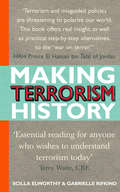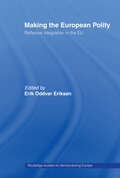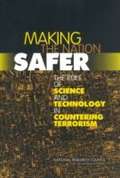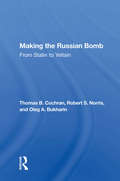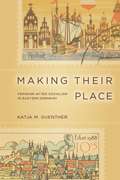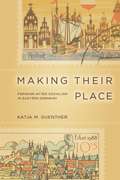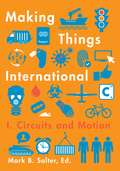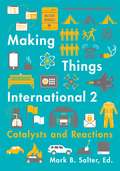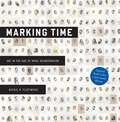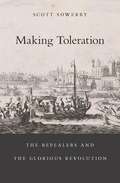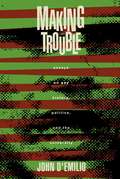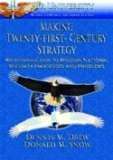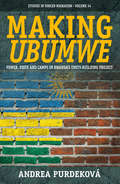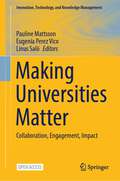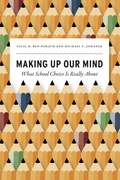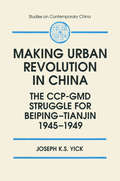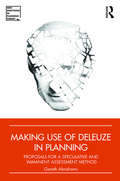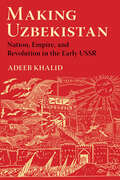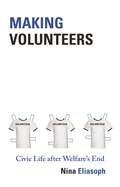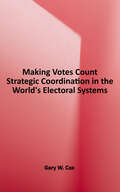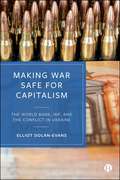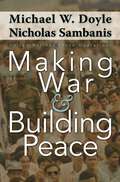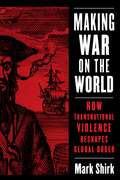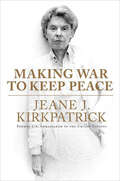- Table View
- List View
Making Terrorism History
by Scilla Elworthy Gabrielle RifkindEver since 9/11 it's been clear we need a new approach to terrorism. In this timely and important book the authors show:* The root causes of terrorism* The links between trauma and fundamentalism* Why people become suicide bombers* Why peace processes collapse* Whether non-violence is a useful response* What can be doneClear, radical and extremely persuasive, Making Terrorism History shows why political violence is now such a major force in our world. At the same time it gives a range of practical actions that can be taken to combat it, not only by our governments but also on the ground in Iraq, Israel and Palestine, and more widely. In addition there are many simple but effective steps that we, too, can take within our local communities to make peace - not war - on terror.
Making Thatcher's Britain
by Ben Jackson Robert SaundersMargaret Thatcher was one of the most controversial figures of modern times. Her governments inspired hatred and veneration in equal measure and her legacy remains fiercely contested. Yet assessments of the Thatcher era are often divorced from any larger historical perspective. This book draws together leading historians to locate Thatcher and Thatcherism within the political, social, cultural and economic history of modern Britain. It explores the social and economic crises of the 1970s; Britain's relationships with Europe, the Commonwealth and the United States; and the different experiences of Thatcherism in Scotland, Wales and Northern Ireland. The book assesses the impact of the Thatcher era on class and gender and situates Thatcherism within the Cold War, the end of Empire and the rise of an Anglo-American 'New Right'. Drawing on the latest available sources, it opens a wide-ranging debate about the Thatcher era and its place in modern British history.
Making The European Polity: Reflexive integration in the EU (Routledge Studies on Democratising Europe)
by Erik Oddvar EriksenToday’s Europe is marked by an amazing pace of integration. The European Union now consists of twenty five member states, however there is confusion and disagreement about its future design. Making The European Polity investigates how the European Union should develop and organize itself and offers a reflexive approach to integration based on the theory of communicative action. It conceives of the EU as a law based supranational polity lacking the identity of a people as well as the coercive means of a state and argues that it is a polity with an organized capacity to act, but no sole apex of authority. Making an important contribution to the theoretical discussions on the EU, these contributors explore a range of issues including legitimacy, post-national democracy and integration and provide in-depth analyses of social and tax policy, foreign policy, identity formation, the reform process and the constitutional effects of enlargement. This book will appeal to all political scientists and particularly to students and researchers of European Politics.
Making The Nation Safer: The Role Of Science And Technology In Countering Terrorism
by Committee on Science Technology for Countering TerrorismVulnerabilities abound in U.S. society. The openness and efficiency of our key infrastructures – transportation, information and telecommunications systems, health systems, the electric power grid, emergency response units, food and water supplies, and others – make them susceptible to terrorist attacks. Making the Nation Safer discusses technical approaches to mitigating these vulnerabilities.
Making The Russian Bomb: From Stalin To Yeltsin
by Thomas B. CochranThe Natural Resources Defense Council once again provides the definitive account of the current status of Russian nuclear weapons. Taking advantage of previously unavailable information the authors describe the origins, growth, and decline of the massive Soviet nuclear weapons production complex-the places involved in the recent headline-making epi
Making Their Place: Feminism After Socialism in Eastern Germany
by Katja GuentherThe collapse of state socialism in eastern and central Europe in 1989 had a dramatic impact on women. Witnessing the loss of state support for their economic activity, the curtailing of their reproductive rights, and the rise of gender ideologies that value women primarily as mothers and wives rather than as active participants in the workforce, women across eastern and central Europe organized on a local level to resist these changes. Making Their Place brings to light how feminist movements in two eastern German cities, Erfurt and Rostock, utilized local understandings of politics and gender to enhance their possibilities for meaningful social change. The book chronicles the specific reasons why place matters, the importance of localized experiences during the socialist era, and how history shapes contemporary identities, cultures, and politics. What emerges is the fascinating story of the different ways people have struggled to define themselves, their values, and their understandings of gender in a period of monumental social, economic, and political upheaval.
Making Their Place: Feminism After Socialism in Eastern Germany
by Katja M. Guenther<div><p class="first">The collapse of state socialism in eastern and central Europe in 1989 had a dramatic impact on women. Witnessing the loss of state support for their economic activity, the curtailing of their reproductive rights, and the rise of gender ideologies that value women primarily as mothers and wives rather than as active participants in the workforce, women across eastern and central Europe organized on a local level to resist these changes. <br></p><p><i>Making Their Place</i> brings to light how feminist movements in two eastern German cities, Erfurt and Rostock, utilized local understandings of politics and gender to enhance their possibilities for meaningful social change. The book chronicles the specific reasons why place matters, the importance of localized experiences during the socialist era, and how history shapes contemporary identities, cultures, and politics. What emerges is the fascinating story of the different ways people have struggled to define themselves, their values, and their understandings of gender in a period of monumental social, economic, and political upheaval.</p></div>
Making Things International 1: Circuits and Motion
by Mark B. SalterBuilding on recent debates in critical social theory and international relations, Making Things International I: Circuits and Motion presents twenty-five essays that engage the global, the local, and the international through the lens of objects. It represents the first substantial new materialist intervention in global politics and international relations, offering a diverse and provocative set of reflections on how different objects create, sustain, complicate, and trouble the international. Problematizing the stuff of global life, Making Things International focuses on contemporary materialist scholarship on the international realm. The first of two volumes, these original contributions by both new and established scholars examine how war, diplomacy, trade, communication, and mobile populations are made by things: weapons, vehicles, shipping containers, commodities, passports, and more. The authors demonstrate how mundane, everyday objects—not normally understood as international—are in fact deeply implicated in how we think of the world: blood, garbage, viruses, traffic lights, clocks, memes, and ships&’ ballast. Contributors: Michele Acuto, U College London; Peter Adey, Royal Holloway U of London; Rune Saugmann Andersen, U of Helsinki; Jessica Auchter, U of Tennessee at Chattanooga; Mike Bourne, Queen&’s U Belfast; Kathleen P. J. Brennan; Elizabeth Cobbett, U of East Anglia; Stefanie Fishel, Hobart and William Smith Colleges; Emily Gilbert, U of Toronto; Jairus Grove, U of Hawai&‘i at Manoa; Charlie Hailey, U of Florida; John Law, Open U; Wen-yuan Lin, National Tsing-hua U; Oded Löwenheim, Hebrew U of Jerusalem; Chris Methmann; Benjamin J. Muller, U of Western Ontario; Can E. Mutlu, Bilkent U; Geneviève Piché; Joseph Pugliese, Macquarie U; Katherine Reese; Michael J. Shapiro, U of Hawai&‘i at Manoa; Benjamin Stephan; Daniel Vanderlip; William Walters, Carleton U; Melissa Autumn White, U of British Columbia; Lauren Wilcox, U of Cambridge; Yvgeny Yanovsky.
Making Things International 2: Catalysts and Reactions
by Mark B. SalterDrawing widely from contemporary social and critical thought, Making Things International 2 offers provocative interventions into debates about causality, connection, and politics through the notion of assemblage. Political assemblages, especially those that cross national borders, can be catalyzed by a host of surprising sparks. Present-day global systems are complex and interdependent, but the worn tools of traditional international relations theory are unsuited to the task of understanding how objects, ideas, and people come together to create, dispute, solve, or perhaps cause these political configurations. Contributors to this volume bring to their work a new sensitivity toward issues of power, authority, control, and sovereignty.The companion volume, Making Things International 1: Circuits and Motion, used things, stuff, and objects in motion to capture the material dynamics of global politics and to demonstrate the importance of the material. This volume builds on that conversation by examining objects that incite political assemblages. Specific subjects include fighter jets, smartphones, tents, HTTP cookies, representations of North Korea, and histories of the diplomatic cable, the orange prison jumpsuit, and container shipping.Contributors: Rune Saugmann Andersen, U of Helsinki; Josef Teboho Ansorge; Claudia Aradau, King&’s College London; Helen Arfvidsson; Alexander D. Barder, Florida International U; Tarak Barkawi, London School of Economics; Peter Chambers; Shine Choi, Seoul National U; Sagi Cohen; Thomas N. Cooke; Anna Feigenbaum, Bournemouth U; Andreas Folkers, Goethe–U Frankfurt; Fabian Frenzel, U of Leicester; Kyle Grayson, Newcastle U; Nicky Gregson, Durham U; David Grondin, U of Ottawa; Xavier Guillaume, U of Edinburgh; Emily Lindsay Jackson, Acadia U; Miguel de Larrinaga, U of Ottawa; Debbie Lisle, Queen&’s U Belfast; Mary Manjikian, Regent U; Nadine Marquardt, Goethe–U Frankfurt; Patrick McCurdy, U of Ottawa; Adam Sandor; Nisha Shah, U of Ottawa; Julian Stenmanns, Goethe–U Frankfurt; Casper Sylvest, U of Southern Denmark; Rens van Munster, Danish Institute for International Studies; Elspeth Van Veeren, U of Bristol; Srdjan Vucetic, U of Ottawa; Juha A. Vuori, U of Turku; Tobias Wille.
Making Time: Art in the Age of Mass Incarceration`
by Nicole R. Fleetwood"A powerful document of the inner lives and creative visions of men and women rendered invisible by America’s prison system. More than two million people are currently behind bars in the United States. Incarceration not only separates the imprisoned from their families and communities; it also exposes them to shocking levels of deprivation and abuse and subjects them to the arbitrary cruelties of the criminal justice system. Yet, as Nicole Fleetwood reveals, America’s prisons are filled with art. Despite the isolation and degradation they experience, the incarcerated are driven to assert their humanity in the face of a system that dehumanizes them. Based on interviews with currently and formerly incarcerated artists, prison visits, and the author’s own family experiences with the penal system, Marking Time shows how the imprisoned turn ordinary objects into elaborate works of art. Working with meager supplies and in the harshest conditions—including solitary confinement—these artists find ways to resist the brutality and depravity that prisons engender. The impact of their art, Fleetwood observes, can be felt far beyond prison walls. Their bold works, many of which are being published for the first time in this volume, have opened new possibilities in American art. As the movement to transform the country’s criminal justice system grows, art provides the imprisoned with a political voice. Their works testify to the economic and racial injustices that underpin American punishment and offer a new vision of freedom for the twenty-first century."
Making Toleration: The Repealers and the Glorious Revolution
by Scott SowerbyIn the reign of James II, minority groups from across the religious spectrum, led by the Quaker William Penn, rallied together under the Catholic King James in an effort to bring religious toleration to England. Known as repealers, these reformers aimed to convince Parliament to repeal laws that penalized worshippers who failed to conform to the doctrines of the Church of England. Although the movement was destroyed by the Glorious Revolution, it profoundly influenced the post-revolutionary settlement, helping to develop the ideals of tolerance that would define the European Enlightenment. Based on a rich array of newly discovered archival sources, Scott Sowerby’s groundbreaking history rescues the repealers from undeserved obscurity, telling the forgotten story of men and women who stood up for their beliefs at a formative moment in British history. By restoring the repealer movement to its rightful prominence, Making Toleration also overturns traditional interpretations of King James II’s reign and the origins of the Glorious Revolution. Though often depicted as a despot who sought to impose his own Catholic faith on a Protestant people, James is revealed as a man ahead of his time, a king who pressed for religious toleration at the expense of his throne. The Glorious Revolution, Sowerby finds, was not primarily a crisis provoked by political repression. It was, in fact, a conservative counter-revolution against the movement for enlightened reform that James himself encouraged and sustained.
Making Trouble: Essays on Gay History, Politics, and the University
by John D'EmilioFirst Published in 1992. Routledge is an imprint of Taylor & Francis, an informa company.
Making Twenty-First-Century Strategy: An Introduction to Modern National Security Processes and Problems
by Donald M. Snow Dennis M. DrewMaking Twenty-first-century Strategy: An Introduction to Modern National Security Processes and Problems
Making Ubumwe: Power, State and Camps in Rwanda's Unity-Building Project (Forced Migration #34)
by Andrea PurdekováSince the end of the Rwandan genocide, the new political elite has been challenged with building a unified nation. Reaching beyond the better-studied topics of post-conflict justice and memory, the book investigates the project of civic education, the upsurge of state-led neo-traditional institutions and activities, and the use of camps and retreats shape the "ideal" Rwandan citizen. Rwanda's ingando camps offer unique insights into the uses of dislocation and liminality in an attempt to anchor identities and desired political roles, to practically orient and symbolically place individuals in the new Rwandan order, and, ultimately, to create additional platforms for the reproduction of political power itself.
Making Universities Matter: Collaboration, Engagement, Impact (Innovation, Technology, and Knowledge Management)
by Linus Salö Pauline Mattsson Eugenia Perez VicoIn an era of rapid change and increasing societal demands, the role of universities as knowledge producers and catalysts for change has come under scrutiny. This open access book offers a fresh perspective on the significance of universities in society, shedding light on how their knowledge can truly matter beyond academia. Drawing upon insightful inquiries from both the Swedish and international contexts, this volume delves into the multifaceted interactions between universities and various knowledge users, emphasizing the need for scholars to reflect on how their knowledge can become useful and applicable to wider society. Organized into three compelling themes, collaboration, engagement, and impact, this book explores the concept of "mattering". Together and jointly, they point at the fluid movement of scholars and scholarly knowledge across academic, political, and public spaces, and the intentional actions of scientists to leverage their expertise for real-world impact. Essential reading for social science and humanities scholars, university management professionals, and individuals keen on a critical understanding of the evolving role of universities, this volume offers a comprehensive examination of how universities have mattered, continue to matter, and can shape the future.
Making Up Our Mind: What School Choice Is Really About (History and Philosophy of Education Series)
by Sigal R. Ben-Porath Michael C. JohanekIf free market advocates had total control over education policy, would the shared public system of education collapse? Would school choice revitalize schooling with its innovative force? With proliferating charters and voucher schemes, would the United States finally make a dramatic break with its past and expand parental choice? Those are not only the wrong questions—they’re the wrong premises, argue philosopher Sigal R. Ben-Porath and historian Michael C. Johanek in Making Up Our Mind. Market-driven school choices aren’t new. They predate the republic, and for generations parents have chosen to educate their children through an evolving mix of publicly supported, private, charitable, and entrepreneurial enterprises. The question is not whether to have school choice. It is how we will regulate who has which choices in our mixed market for schooling—and what we, as a nation, hope to accomplish with that mix of choices. Looking beyond the simplistic divide between those who oppose government intervention and those who support public education, the authors make the case for a structured landscape of choice in schooling, one that protects the interests of children and of society, while also identifying key shared values on which a broadly acceptable policy could rest.
Making Urban Revolution in China: The CCP-GMD Struggle for Beiping-Tianjin, 1945-49 (Studies On Contemporary China)
by Joseph K.S. YickThe end of the Sino-Japanese War in 1945 brought not peace but renewed confrontation between Mao Zedong's Chinese Communist Party and Chiang Kaishek's Guomindang. The ensuing Civil War, at the threshold of the Cold War, held enormous significance for international strategic alliances, and in particular the interests of the United States in East Asia, and has been the subject of intense research and debate ever since. Joseph Yick's Making Urban Revolution in China: The CCP-GMD Struggle for Beiping-Tianjin, 1945-1949, based partly on the rich new sources available in the PRC since 1978, rethinks the traditional interpretations of the Chinese Communist Party's victory in 1949 and makes a major contribution to the historiography of this period.
Making Use of Deleuze in Planning: Proposals for a speculative and immanent assessment method (New Directions in Planning Theory)
by Gareth AbrahamsMaking Use of Deleuze in Planning translates and re-creates some of Gilles Deleuze’s most abstract philosophical concepts to form a new, practicable planning assessment tool. It shows what his philosophy can do for planning theory as well as planning assessment practice and, in doing so, sets out a pragmatic approach to Deleuzian studies: one that helps form bridges between ontological problems and the problems found in professional practice. It also breaks new ground in assessment methodology by challenging the essentialist ideas underpinning assessment methods like BREEAM and setting out and testing a new form of non-essentialist assessment named SIAM. The book argues that Deleuze’s philosophy can be made useful to planning as long as one is prepared to adapt and re-create his key ontological concepts to respond to the specific demands of the field.
Making Uzbekistan: Nation, Empire, and Revolution in the Early USSR
by Adeeb KhalidIn Making Uzbekistan, Adeeb Khalid chronicles the tumultuous history of Central Asia in the age of the Russian revolution. He explores the complex interaction between Uzbek intellectuals, local Bolsheviks, and Moscow to sketch out the flux of the situation in early-Soviet Central Asia. His focus on the Uzbek intelligentsia allows him to recast our understanding of Soviet nationalities policies. Uzbekistan, he argues, was not a creation of Soviet policies, but a project of the Muslim intelligentsia that emerged in the Soviet context through the interstices of the complex politics of the period. Making Uzbekistan introduces key texts from this period and argues that what the decade witnessed was nothing short of a cultural revolution.
Making Volunteers: Civic Life after Welfare's End (Princeton Studies in Cultural Sociology #50)
by Nina EliasophAn inside look at how community service organizations really workVolunteering improves inner character, builds community, cures poverty, and prevents crime. We've all heard this kind of empowerment talk from nonprofit and government-sponsored civic programs. But what do these programs really accomplish? In Making Volunteers, Nina Eliasoph offers an in-depth, humorous, wrenching, and at times uplifting look inside youth and adult civic programs. She reveals an urgent need for policy reforms in order to improve these organizations and shows that while volunteers learn important lessons, they are not always the lessons that empowerment programs aim to teach.With short-term funding and a dizzy mix of mandates from multiple sponsors, community programs develop a complex web of intimacy, governance, and civic life. Eliasoph describes the at-risk youth served by such programs, the college-bound volunteers who hope to feel selfless inspiration and plump up their resumés, and what happens when the two groups are expected to bond instantly through short-term projects. She looks at adult "plug-in" volunteers who, working in after-school programs and limited by time, hope to become like beloved aunties to youth. Eliasoph indicates that adult volunteers can provide grassroots support but they can also undermine the family-like warmth created by paid organizers. Exploring contradictions between the democratic rhetoric of empowerment programs and the bureaucratic hurdles that volunteers learn to navigate, the book demonstrates that empowerment projects work best with less precarious funding, more careful planning, and mandatory training, reflection, and long-term commitments from volunteers.Based on participant research inside civic and community organizations, Making Volunteers illustrates what these programs can and cannot achieve, and how to make them more effective.
Making Votes Count: Strategic Coordination In The World's Electoral Systems (Political Economy Of Institutions And Decisions Ser.)
by Gary W. CoxPopular elections are at the heart of representative democracy. Thus, understanding the laws and practices that govern such elections is essential to understanding modern democracy. In this book, Cox views electoral laws as posing a variety of coordination problems that political forces must solve. Coordination problems - and with them the necessity of negotiating withdrawals, strategic voting, and other species of strategic coordination - arise in all electoral systems. This book employs a unified game-theoretic model to study strategic coordination worldwide and that relies primarily on constituency-level rather than national aggregate data in testing theoretical propositions about the effects of electoral laws. This book also considers not just what happens when political forces succeed in solving the coordination problems inherent in the electoral system they face but also what happens when they fail.
Making War Safe for Capitalism: The World Bank, IMF, and the Conflict in Ukraine
by Elliot Dolan-EvansThis book examines the impact of World Bank and International Monetary Fund (IMF) economic restructuring programmes during active conflicts. Using a critical political economy perspective, the book explores how these restructuring efforts affect vulnerable communities’ survival amid violence. Chapters provide a detailed case study of Ukraine during the War in Donbas, analysing the controversial reforms in agriculture, gas and pension sectors. The resulting analysis offers valuable insights into how these reforms have influenced Ukraine’s political economy and the survival of conflict-affected populations since the 2022 Russian invasion.
Making War and Building Peace: United Nations Peace Operations
by Michael W. Doyle Nicholas SambanisMaking War and Building Peace examines how well United Nations peacekeeping missions work after civil war. Statistically analyzing all civil wars since 1945, the book compares peace processes that had UN involvement to those that didn't. Michael Doyle and Nicholas Sambanis argue that each mission must be designed to fit the conflict, with the right authority and adequate resources. UN missions can be effective by supporting new actors committed to the peace, building governing institutions, and monitoring and policing implementation of peace settlements. But the UN is not good at intervening in ongoing wars. If the conflict is controlled by spoilers or if the parties are not ready to make peace, the UN cannot play an effective enforcement role. It can, however, offer its technical expertise in multidimensional peacekeeping operations that follow enforcement missions undertaken by states or regional organizations such as NATO. Finding that UN missions are most effective in the first few years after the end of war, and that economic development is the best way to decrease the risk of new fighting in the long run, the authors also argue that the UN's role in launching development projects after civil war should be expanded.
Making War on the World: How Transnational Violence Reshapes Global Order (Columbia Studies in International Order and Politics)
by Mark ShirkThe state bounds politics: it constructs and enforces boundaries that separate what it controls from what lies outside its domain. However, states face a variety of threats that cross and challenge their geographical and conceptual boundaries. Transnational violent actors that transcend these boundaries also defy the state’s claims to political authority and legitimacy.Mark Shirk examines historical and contemporary state responses to transnational violence to develop a new account of the making of global orders. He considers a series of crises that plagued the state system in different eras: golden-age piracy in the eighteenth century, anarchist “propagandists of the deed” at the turn of the twentieth, and al-Qaeda in recent years. Shirk argues that states redraw conceptual boundaries, such as between “international” and “domestic,” to make sense of and defeat transnational threats. In response to forms of political violence that challenged boundaries, states developed creative responses that included new forms of control, surveillance, and rights. As a result, these responses gradually made and transformed the state and global order. Shirk draws on extensive archival research and interviews with policy makers and experts, and he explores the implications for understandings of state formation. Combining rich detail and theoretical insight, Making War on the World reveals the role of pirates, anarchists, and terrorists in shaping global order.
Making War to Keep Peace: Trials and Errors in American Foreign Policy from Kuwait to Baghdad
by Jeane J. KirkpatrickWith the powerful words that marked her long and distinguished career, Jeane J. Kirkpatrick explores where America has gone wrong—and raises lingering questions about what perils tomorrow might hold. In Making War to Keep Peace, the former U.S. Ambassador to the UN traces the course of diplomatic initiatives and armed conflict in Iraq, Somalia, Haiti, Bosnia, and Kosovo to illuminate the dangerous shift from the first Bush administration's ambitious vision of a New World Order to the overambitious nation-building efforts of the Clinton administration. Kirkpatrick questions when, how, and why the United States should resort to military solutions—especially in light of the George W. Bush administration's challenging war in Iraq, about which Kirkpatrick shares her "grave reservations" for the first time.
